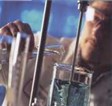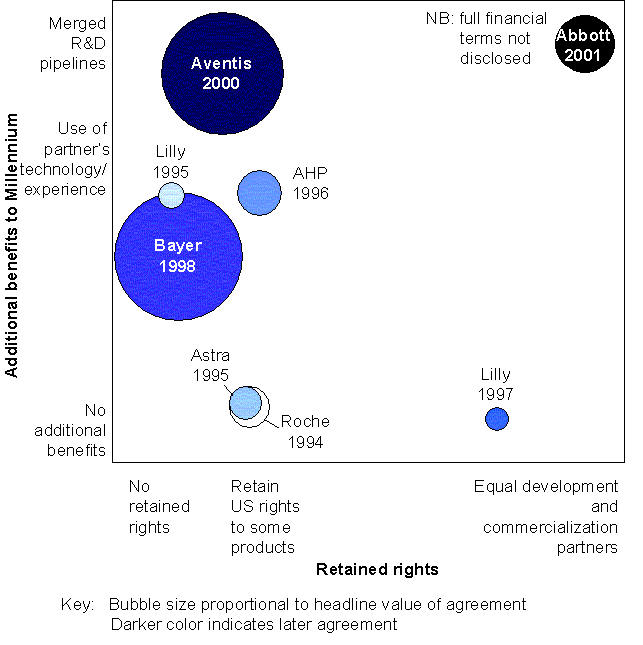Human Genome Sciences free to partner, but the prize comes at a price

Human Genome Sciences (HGS) formed the first major genomics agreement with SmithKline Beecham (now GlaxoSmithKline) in 1993. For $125m, HGS granted SmithKline Beecham options to all of the products generated by its technologies. As of 1 July 2001 the agreement is over, and HGS is now free to develop products itself or to form lucrative licensing agreements with any partner it chooses.
Datamonitor's currently ongoing analysis, Genomics: Pharmaceutical Investment, Integration and Partnerships, reveals:
- In-licensers will benefit from high productivity and shorter development timelines for products resulting from genomics technologies
- HGS is now able to command high prices and favorable terms for future partnerships
As an enabling technology, genomics is too young to prove its productivity. However, genomics can undoubtedly generate large numbers of new drug targets very rapidly. Millennium's 1998 agreement with Bayer, for example, had already resulted in over 80 new targets by January 2001. Given that the entire pharmaceutical industry had previously been working with only 400-500 targets, this represents a substantial achievement. In January 2001, Millennium announced that Bayer had moved a compound discovered as a result of the agreement into clinical development for a cancer indication. As this compound was developed from one of 18 targets discovered 16 months previously, this suggests that the conversion rate from targets to compounds with clinical potential is at least 5%, and possibly higher given more time. This figure is consistent with that projected by CuraGen and Bayer for their 2001 genomics research agreement. Bayer's pipeline could, therefore, benefit by at least 11 new compounds as a result of its agreement with Millennium.
Bayer made an upfront payment of $100m to Millennium, including an equity investment. If it identifies 11 new compounds for clinical development as a result of the agreement, this suggests a cost of around $9m per product. This is in excess of the $5m average for a preclinical or phase I product. Thus, Bayer is paying over the odds for the compounds it will gain as a result of its agreement with Millennium, especially since it is conducting its own early stage R&D.
However, while gaining access to external genomics technologies is currently expensive, the products it generates may be cheaper to develop than traditionally discovered pharmaceuticals. The 18 months taken by Millennium/Bayer's target to yield a compound and for it to complete preclinical trials compares very favorably to the standard of several years. Similarly, HGS has two genomics derived products in phase II trials each which took less than six months to show safety in human subjects, compared to an industry standard of nearly three years. This suggests that initial high costs of in-licensing genomics technologies or products will be offset by substantially reduced development times.
If the demonstrated rapid progress in preclinical and phase I trials is sustained throughout development, it could cut the cost of R&D in half. More importantly, it would increase a potential product's patented time on the market by several years. It is too early to forecast sales for the products currently in phase II clinical trials. However, all of HGS' development compounds have broad potential indications in diseases of high unmet need. If clinical trials continue to be positive, the products are likely to generate hundred of millions of dollars annually.
HGS is now able to command high prices and favorable terms for future partnerships
Datamonitor believes that genomics collaborations will be most productive if they offer win-win terms for both sides. The leading genomics companies are now demanding this, asking for equal terms with potential partners and, in parallel, raising their prices. Millennium has been in the vanguard of this process, continually increasing its own involvement in product development and marketing, while receiving ever higher fees for access its technology.
Millennium's first high profile deal, with Bayer for a headline value of $465m, was remarkable primarily for its size. Millennium's previous agreements had uniformly offered it value over and above their price. For example, in a 1995 agreement with Lilly for $50m and a 1996 agreement with American Home Products for $90m, Millennium gained access to the other companies' technologies for its own use. The agreement with Bayer did not offer these additional benefits and Millennium did not retain marketing rights over products; essentially it traded its usual benefits for the high payment.
The agreement with Bayer raised the bar for the price of a genomics agreement. Millennium has since continued to demand high fees while carefully repositioning itself as an equal partner rather than as a service provider. In 2000, Millennium formed an alliance with Aventis with a total headline value of $450m, in which development and marketing decisions are to be made jointly by the participants. This deal illustrated the shift in pharmaceutical company attitudes towards genomics companies, recognizing that simple service providers have neither the incentive nor the means to drive a project to its maximum potential. This culminated in 2001 in Millennium forming an agreement in which it effectively merged its R&D pipeline in diabetes and obesity with that of Abbott, forming a truly equal relationship to research, develop and marketing products in those areas. Although full financial terms were not disclosed, the agreement included a $250m equity investment by Abbott in Millennium, over twice the initial payment made by Bayer in the 1998 agreement.
Datamonitor expects that HGS will not rapidly make any major agreements. Tying itself into another commitment that could seriously restrict its future maneuverability is not in its best interests. However, with its lead product in only phase IIb trials, the company will have to raise cash and so is very likely to form at least one major collaboration over the course of the next two years.
Datamonitor Managing Analyst Melanie McCullagh comments: "There are high potential rewards for potential partners. However, HGS has ambitions to join the ranks of the market leading pharmaceutical companies, and it will not settle for a service provider relationship."
Datamonitor estimates that the potential cost of partnering with HGS will be in excess of $300m dollars, plus a willingness to allow HGS substantial involvement in product development and marketing.

Source: Datamonitor
For further information on this press release, please contact Elisabeth Overend-Freeman at efreeman@datamonitor.com .
Datamonitor is an independent market analysis firm that publishes a wide portfolio of strategic business information. Datamonitor has expertise in the following industry sectors: Automotive & Transport; Consumer; Financial Services; Healthcare; Industrial; Medical Devices; Technology. Datamonitor can be contacted at (212) 686-7400 or visit www.datamonitor.com.
Source: Datamonitor
